Benin, Building Public Awareness of the NDC
UN CC:Learn, in collaboration with the NDC Partnership, continued to support the Government of Benin in implementing the project “Communicate and Monitor the NDC and the Partnership Plan Implementation“. The following activities took place:
- Development and dissemination of communication materials on the NDC.
- Organization of different public broadcasts on climate change and the NDC.
- Celebration of the National Tree Day, including a tree-planting session with 1,500 indigenous seedlings.
- Organization of a national exchange workshop on the theme of “Land restoration, desertification and drought resilience” on the occasion of World Environment Day 2024.
- Upgrading and launch of the national NDC website and monitoring platform.
- Delivery of training for Government, NGO, civil society, and private sector stakeholders on the use of the NDC monitoring platform to report on NDC implementation projects.
- Organization of a partner meeting on the implementation of the NDC Partnership Plan.
- Follow-up care of the seedlings planted during the National Tree Day through collaboration with a national NGO and the engagement of the local community, including 80 youth ambassadors sensitized on climate issues.
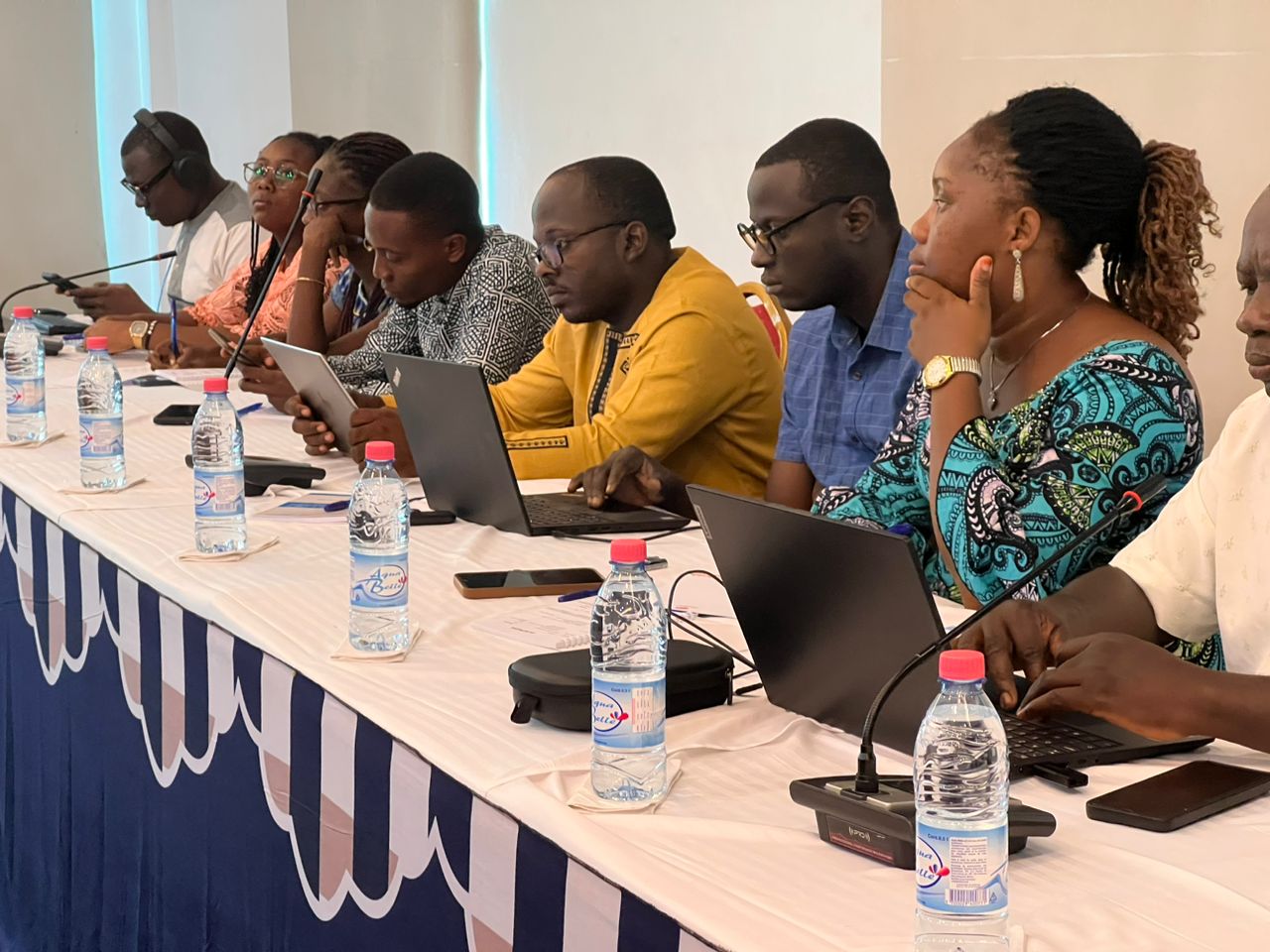
Burkina Faso, Building Knowledge of the NDC
The implementation of the project “Improve Knowledge of the NDC and Lessons Learned from its Implementation during 2015-2020 at the National and Regional Level” was kick-started in 2024.
Several activities took place, including:
- Development of a synthesis report evaluating the first NDC of Burkina Faso in three formats.
- Preparation of messages for related communications materials targeted at both an expert audience and the general public, along with a detailed dissemination.
- Preparation and development of resources for a series of national and regional workshops planned in 2025.

Ecuador, Taking Firm Steps on the Path towards Climate Empowerment
In 2024, Ecuador began co-creating its National Strategy for Action for Climate Empowerment (ENACE), led by the Ministry of Environment, Water, and Ecological Transition (MAATE), in collaboration with UNICEF and UN CC:Learn. This effort supports national climate goals and aligns with the six ACE pillars of the UNFCCC.
The process has been broad and participatory, involving over 240 participants from more than 120 institutions across the country. These dialogues helped shape priorities and strategies for each ACE pillar, resulting in a draft strategy set to launch in 2025.
ENACE aims to strengthen climate education, training, and awareness, and aligns with Ecuador’s NDC, Climate Finance Strategy, and National Environmental Education Strategy.
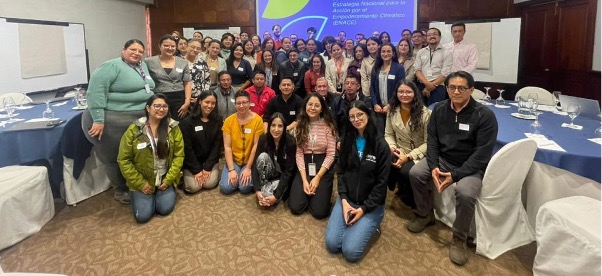
Participants at a workshop in Quito, Ecuador. Photo credit: UN CC:Learn
Ethiopia, An NDC Implementation Plan for the Education Sector
Ethiopia took a significant leap forward in 2024 to upscale national climate change education by developing and launching the NDC Implementation Plan for the Education Sector. This milestone builds on the National Climate Change Education Strategy (NCCES), which was developed with UN CC:Learn support in 2017 to provide a robust foundation for incorporating climate education and awareness into Ethiopia’s education system.
The Plan was prepared by representatives from the Environmental Protection Authority (EPA), the Ministry of Education, the Ministry of Planning and Development, the NDC Partnership, and UN CC: Learn.
It sets out two primary outcomes:
- Improve students’ competencies on climate change through curriculum integration, training for teachers and other relevant parties, and awareness-raising workshops and materials.
- Enhance the understanding of climate change concepts among adult learners, focusing on farmers, community leaders, policymakers, and informal learners.
Through the NDC Implementation Plan, Ethiopia is leveraging the education sector as a key driver of climate resilience and sustainable development.
Ghana, Raising Public Awareness and Empowering Youth
In 2024, UN CC:Learn continued to assist the Government of Ghana in promoting climate change awareness and learning as part of the implementation of the National Climate Change and Green Economy Learning Strategy.
This included:
- Support for the organization of a new edition of the Climate Change Quiz for high-school students,
- Organize a Youth Climate Dialogue as part of the National Climate Change and Green Economy Week 2024, and,
- Collaborate with the youth-led non-profit organization Center for Climate and Sustainability Empowerment (CCSE) and the University of Ghana to build university students’ knowledge and empower them to take climate action in their communities.
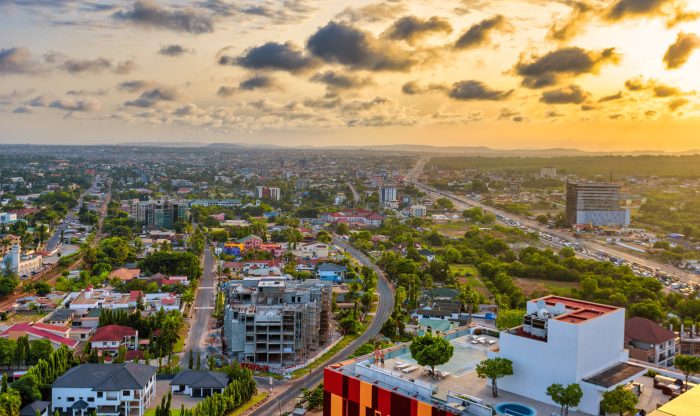
Aerial view of Accra, Ghana.
Kenya, Raising Awareness through Arts
In 2024, Kenya schools nationwide participated in the First Lady’s Mazingira Awards (FLAMA), inviting students to creatively express their understanding, perceptions, and solutions for environmental conservation and climate change. The Climate Change Arts and Essay Competition was organized with the collaboration of national partners and saw the participation of over 1,000 schools from 47 counties. It culminated in a ceremony with over 400 children, 100 teachers, and 200 guests held in the State House, Nairobi, where winners were awarded across the art, written essay, and spoken word categories.
The Climate Change Arts and Essay Competition is part of Kenya’s National Climate Change Learning Strategy targets to leverage non-formal and informal education to promote climate change learning.
Kyrgyz Republic, Scaling-up Capacities for Climate Action
UN CC:Learn and UNDP are working closely with the Government of the Kyrgyz Republic to update the country’s Comprehensive Plan of Measures on Climate Change Learning. Throughout 2024, several key activities were carried out, including:
- An empirical assessment of climate learning needs and current education offerings;
- A sectoral analysis of priority learning gaps;
- Stakeholder consultations; and
- The drafting of an updated Plan of Measures.
A fully costed action plan on climate education is also being developed. This plan is expected to inform national budget planning and support efforts to mobilize additional resources.
This initiative builds on a long-standing collaboration in the Kyrgyz Republic, as well as regional experience. It has also helped catalyze additional support from UNITAR to assist in the development and early implementation of the country’s NDC 3.0.
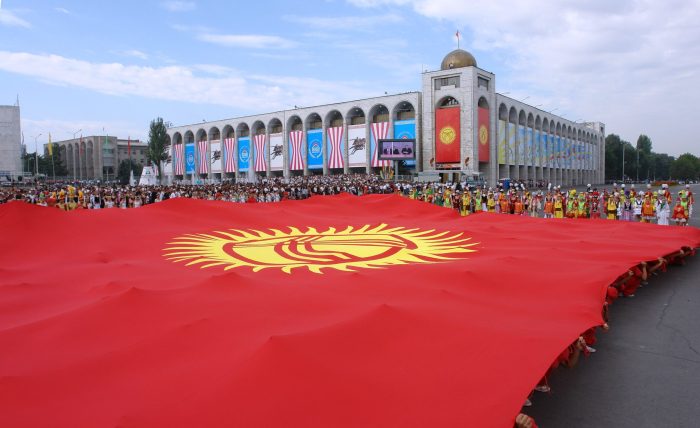
Kyrgyz flag at Ala Too Square in Bishkek, Kyrgyz Republic.
Liberia, Making Strides towards Climate Literacy
Liberia took key steps to advance its National Climate Change Learning Strategy development process in 2024. The project started with an inception workshop with the participation of 30 stakeholders from diverse sectors. Representation from legislative attendees underscored the country’s political support for climate education.
The workshop also included a comprehensive review of the Background Report and Stakeholder Analysis, and provided the opportunity for participants to identify national priorities and define a vision and objectives for the National Strategy. These serve as a foundation for the next steps, such as the upcoming needs assessment and the development of the learning action plan.
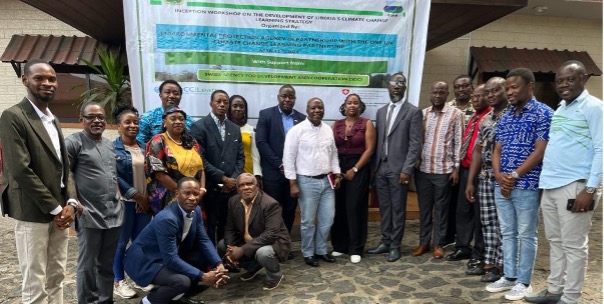
National Inception Workshop in Liberia. Photo credit: UN CC:Learn
Niger, Spreading Knowledge of the NDC
UNITAR/UN CC:Learn worked with the Government of Niger and the NDC Partnership to define the scope of a project proposal dedicated to improving the awareness and engagement of national stakeholders on the NDC. The project was subsequently accepted to advance the following interventions:
- Develop and broadly disseminate a series of communication materials on the content of the NDC.
- Organize awareness and information workshops on the NDC across three regions of Niger.
- Organize university events to raise the awareness of university students on climate change and the NDC.
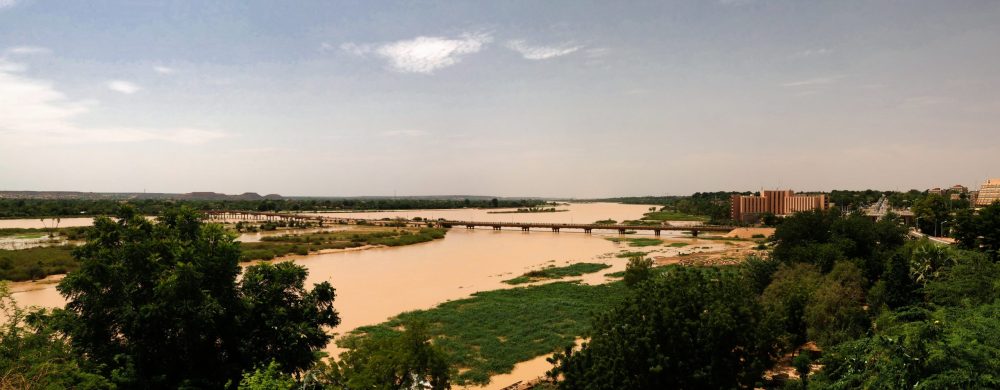
Aerial view of the Niger River and Niamey city, Niger.
Uganda, Mobilizing Resources for Youth Engagement on Climate Change
In 2024, UN CC:Learn continued its collaboration with Uganda’s Ministry of Water and Environment to implement the National Strategy and Action Plan on Climate Change Learning, launched in 2013.
With youth comprising over 70% of the population, their engagement is vital. UN CC:Learn supported the Ministry in exploring opportunities to mobilize resources for a new project on “Strengthening Youth Knowledge and Engagement on Climate Change”. More specifically, a proposal was jointly developed with Climate Change Adaptation and Innovation (CHAI) for submission to Germany’s IKI Small Grants Programme. A national consultant also supported coordination with stakeholders and alignment with other national initiatives.
Zambia, The FACE-NDC Project
The FACE-NDC project was created to implement the UN CC:Learn-supported National Climate Change Learning Strategy of Zambia. The findings of the assessment will inform the development of a capacity-building programme for the public and private sectors starting in 2025.
Regional Declaration on Climate Education in West Africa
Over the past three years, UN CC:Learn has been working with a core group of West African Sahelian countries to raise awareness of climate change education through coalition-building, vision-setting, baseline analysis, and the development of a political declaration.
The Regional Declaration on Strengthening Climate Change Education was officially launched and opened for signature during a high-level event at COP28 of the UNFCCC, with initial signatures by the Ministers of Environment of five countries.
Throughout 2024, 6 additional countries signed the Declaration. A dedicated workshop in Senegal offered a valuable platform for diverse stakeholders, from government officials to civil society representatives, to understand its objectives and discuss strategies for enhancing climate change education nationally and regionally.
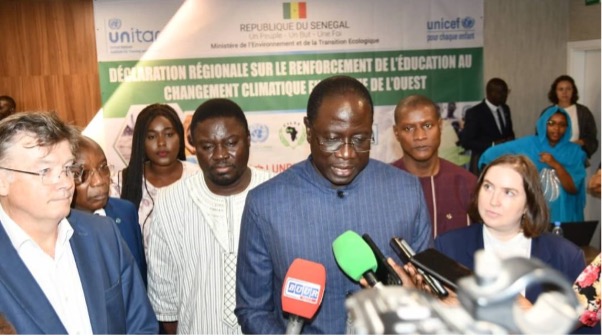
Mr. Daouda Ngom, Minister of Environment and Green Transition, giving an interview at the workshop. Photo credit: Government of Senegal

 Go Back
Go Back